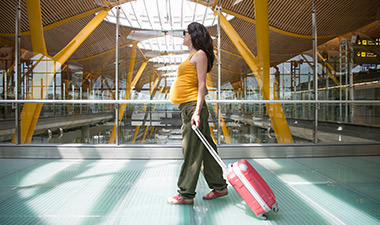Travel and pregnancy
Can I travel while I’m pregnant?
Most women need to travel at least some distances often locally and by car. Some women will have the need or desire to travel longer distances perhaps by car or airplane or other means. For most pregnant women, travel will be no problem in the first 20-24 weeks of pregnancy. Once you are past 24 weeks, you will need to consider how far you will be from home, what hazards the area you are travelling to may pose, and how you will get there. Long flights or road trips may be difficult once you are into the later stages of pregnancy. There may be issues regarding unanticipated needs for care related to the pregnancy while outside of Canada. This can be quite expensive and having Canadian health care coverage will probably not cover all the costs. Consider obtaining commercial coverage and ensure what the benefits are. If you will be travelling bring with you a copy of your pregnancy records to be given to the health care provider where you may be if necessary.
How do I travel by car safely while pregnant?
When travelling by car, always wear your seat belt and have it adjusted properly. This means having the lap belt across the bones of the pelvis. The cross-chest belt, as the uterus gets bigger, should be worn across the uterus. This protects both mother and baby in the case of an accident. If you will be travelling for long distances there is the risk of increased swelling your feet from prolonged sitting at a rare but serious risk of developing blood clots in veins in the legs. About every two hours, stop and get out and walk around for a few minutes. Remain well hydrated. In the later stages of pregnancy as delivery approaches, be sure you have a proper newborn child seat fitted to your vehicle.
Can I travel by air while I’m pregnant?
Major travel plans should be discussed with your health care provider as you may need vaccinations or other precautions while you are gone. If you are travelling internationally, check the Public Health Agency of Canada website for travel health and safety. Most airlines will allow pregnant women to fly up to and including the 36th week of pregnancy. You may need a note from your health care provider – talk to your airline before you fly. It’s also a good idea to check that your travel insurance will cover your costs if you were to go into labour, and that it will cover the costs of your baby should your baby need special care. If you are traveling away from the community where you plan to deliver, ask your caregiver for a copy of your prenatal record in case you need to seek care while you are away. When you are on a longer flight, be sure to get up and stretch frequently and stay hydrated.
I’m travelling while pregnant, should I take any special precautions?
Vaccines. Depending on the area you are travelling to, you may need vaccines. In general, pregnant women are advised not to get live vaccines (measles, mumps, rubella), but can safely be given inactivated vaccines (Hepatitis B, tetanus, diphtheria).
Malaria. Travelling to areas where contracting malaria is possible is best avoided. Getting malaria while you are pregnant can cause health problems for both you and your baby. If you have no choice but to travel to an area where malaria is present, talk to your health care provider about the possibility of taking an anti-malarial medication.
Zika virus. Zika virus is a mosquito-transmitted virus that generally causes mild symptoms, but is associated with microcephaly in infants whose mothers contract the virus during pregnancy. Avoid travel to areas of where there are outbreaks of Zika virus. If this is unavoidable, you should follow strict measures to prevent yourself from getting mosquito bites. The SOGC and the Public Health Agency of Canada are continuing to monitor Zika’s spread and impact. The SOGC’s Infectious Disease Committee has prepared an FAQ on the latest guidance on Zika virus.
Deep vein thrombosis. Deep vein thrombosis is when you develop blood clots, often in the legs. If your travel plans will require you to sit for prolonged periods of time, be sure you get up and stretch your legs regularly. A walk up and down the aisle every 30-60 minutes can reduce your risk.
High altitude. Except for air travel, pregnant women should avoid altitudes above 3658 m (12,000 ft.). In later pregnancy, or if your pregnancy is high risk, you should stay below 2500 m (8,200 ft.).
Safe food and water. If you are travelling to an area where the drinking water may be of poor quality or food-borne illness is common, take extra precautions. Drink only bottled water and eat well cooked food. Avoid unpasteurized dairy products and raw or undercooked meat or fish. If you develop diarrhea or vomiting, contact a health care provider as soon as possible. Don’t use Pepto Bismol® to treat any stomach upset.

